|
|
|
Sort Order |
|
|
|
Items / Page
|
|
|
|
|
|
|
| Srl | Item |
| 1 |
ID:
140688


|
|
|
|
|
| Summary/Abstract |
In this article, I show how Prime Minister Abe Shinzo has promoted two major national and international economic policies—Abenomics and Japan’s involvement in the Trans-Pacific Partnership— by focusing on his administration’s domestic political struggles. Both agendas become significant in the face of China’s regional engagement, demonstrating the inextricable ties between international affairs and domestic politics, a combination essential for grasping the “Abe effect” in foreign policy. KEYWORDS: Abenomics, TPP, decisionmaking process, agricultural reform in Japan.
|
|
|
|
|
|
|
|
|
|
|
|
|
|
|
|
| 2 |
ID:
128428
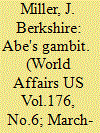

|
|
|
|
|
| Publication |
2014.
|
| Summary/Abstract |
China's aggressive actions in the East China Sea, combined with other factors, especially North Korea's continuing intransigence, have created an increasingly hostile security environment for Japan. Its response to these events can be seen in the impressive political rebirth of Shinzo Abe and the Liberal Democratic Party. While Abe, currently serving as prime minister for a second time, was elected largely because of his economic policies and the ineptitude of the formerly ruling Democratic Party of Japan, he has used his mandate to press forward with long needed, albeit controversial, defense and security reforms that indicate the seriousness with which Tokyo takes its current situation. With China looming up in front of them, and Pyongyang posing lesser but still worrisome threats, the Japanese have become acutely aware of the fact that their Self-Defense Forces (SDF) have one hundred and forty thousand ground troops, one hundred and forty-one maritime vessels, and four hundred and ten aircraft, while China's People's Liberation Army has one million six hundred thousand troops and North Korea has one million soldiers. Meanwhile, North Korea maintains a significant, if decaying, navy and air force, with one hundred and ninety vessels and approximately six hundred aircraft. China's much more capable maritime and air assets include nine hundred and seventy vessels and two thousand five hundred and eighty aircraft.
|
|
|
|
|
|
|
|
|
|
|
|
|
|
|
|
| 3 |
ID:
130617


|
|
|
| 4 |
ID:
052527
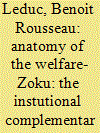

|
|
|
|
|
| Publication |
Winter 2003-04.
|
|
|
|
|
|
|
|
|
|
|
|
|
|
|
|
| 5 |
ID:
155209
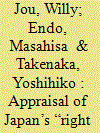

|
|
|
|
|
| Summary/Abstract |
The conservative Liberal Democratic Party won overwhelming victories in the 2012, 2013, 2014, and 2016 elections in Japan. We discuss whether this reflected a rightward shift in the electorate, by examining how major parties and leaders are identified with particular ideological poles, and citizen–government distance on a range of issues.
|
|
|
|
|
|
|
|
|
|
|
|
|
|
|
|
| 6 |
ID:
140684


|
|
|
|
|
| Summary/Abstract |
“Is Japan back?” Economically, the evidence is mixed at best due largely to slowness in carrying out vital structural reforms. In electoral terms, the Liberal Democratic Party has regained much of its prior dominance under Abe Shinzo. Most problematic of all, Japan is not back at all in regaining a commanding position within East Asia, in part due to its slow economic transformation, but due also to the atavistic positions taken by Abe’s government on the historical interpretations of Japanese behavior in World War II. KEYWORDS: Abe, Abenomics, structural reform, Liberal Democratic Party, Asian regionalism.
|
|
|
|
|
|
|
|
|
|
|
|
|
|
|
|
| 7 |
ID:
130819
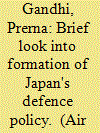

|
|
|
| 8 |
ID:
098381
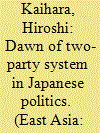

|
|
|
|
|
| Publication |
2010.
|
| Summary/Abstract |
The long rule of the Liberal Democratic Party (LDP) has finally ended, and the Democratic Party of Japan (DPJ) has captured government. This article is to examine why and how that has ended and what are the major factors which have contributed to the change of government. The inability of Japanese opposition parties to capture government has been discussed for a long time. The first part of this article is to examine the strength and weakness of major structural explanations which have been discussed in existing literature. Then, the article proposes a process-level analysis which takes a synergistic effect among institution, strategy and chance seriously. The second part of the article is a short history of the emergence of the Democratic Party of Japan (DPJ) as a ruling party. The history will start with a formation of a small political party in September 1996,and describe how a new single-member electoral system shaped the incentives of political actors, how they worked out political strategy under the new system, and how chance affect the success or failure of political strategy.
|
|
|
|
|
|
|
|
|
|
|
|
|
|
|
|
| 9 |
ID:
163384
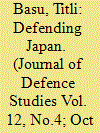

|
|
|
|
|
| Summary/Abstract |
Three key developments unfolded in Japan in August 2018: the Ministry of Defence (MOD) released its annual Defence White Paper; requested a 2.1 per cent increase in the 2019 budget; and instituted an Exploratory Committee on the Future of Self Defence Forces (SDF) with the objective of reviewing the current National Defence Program Guidelines (NDPG) and the Mid-Term Defence Program (MTDP). The subsequent consolidation of political strength in September 2018 at the Liberal Democratic Party’s (LDP) presidential election extended Prime Minister Shinzo Abe’s tenure till 2021. Analysing these developments in the backdrop of Prime Minister Abe’s top priorities—managing the United States (US)-Japan alliance under the Trump Presidency and delivering on the ‘great responsibility’ of redefining Japanese post-war security orientation—unpacks Tokyo’s key challenges. These are, essentially, balancing between sharing greater burden within the alliance framework to ensure regional security on one hand, and weighing regional sensitivities and deeply fractured domestic constituencies on the other.
|
|
|
|
|
|
|
|
|
|
|
|
|
|
|
|
| 10 |
ID:
117076
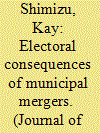

|
|
|
|
|
| Publication |
2012.
|
| Summary/Abstract |
The dominance of Japan's Liberal Democratic Party (LDP) was long buttressed by the existence of a strong political support base in the rural areas led by local politicians who worked on behalf of national LDP politicians seeking reelection. In recent years, municipal mergers have drastically weakened the LDP's support base by reducing the number of local politicians and redrawing electoral district boundaries. Surprisingly, the main opposition party, the Democratic Party of Japan (DPJ), could not take full advantage of these new institutional arrangements. Instead, local politicians have become more independent of both major parties. As a result, at a time of increasing numbers of floating voters, neither of Japan's two major parties has a reliable local base across the country. To succeed, both parties must pay attention to the changing needs of the increasingly independent-and very often still rural-localities.
|
|
|
|
|
|
|
|
|
|
|
|
|
|
|
|
| 11 |
ID:
117036
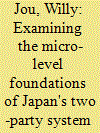

|
|
|
|
|
| Publication |
2012.
|
| Summary/Abstract |
A consensus exists among political scientists and the media that a two party system has become firmly established in Japan, and power alternation following the 2009 House of Representatives election seemed to confirm this trend. In contrast, in this study I draw on both election and public opinion data to illustrate that Japan's two-party system rests on fragile micro foundations, particularly since the change of government, and may therefore not constitute a stable equilibrium. Specifically, the two-party system is sustained by the logic of competition in single member districts, but lacks strong backing among a large proportion of the public. Evidence in support of this argument include 1) decreasing vote shares for both the Liberal Democratic Party and the Democratic Party of Japan in the 2010 House of Councillors election, and 2) a weakening relationship between support for these two parties in monthly polls, in contrast to previous years when LDP and DPJ ratings mirrored one another. I discuss some potential implications of these developments, such as the growing prominence of regional parties and prospects for electoral rule changes.
|
|
|
|
|
|
|
|
|
|
|
|
|
|
|
|
| 12 |
ID:
100580


|
|
|
|
|
| Publication |
2010.
|
| Summary/Abstract |
This study seeks to identify the factors that caused the historic defeat of Japan's longdominant party in the 2009 election. Employing district-level data, I show that a large national swing occurred that overrode district-specific characteristics, and that the electoral coordination of opposition parties helped bring about victory.
|
|
|
|
|
|
|
|
|
|
|
|
|
|
|
|
| 13 |
ID:
184035
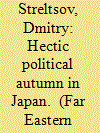

|
|
|
|
|
| Summary/Abstract |
Autumn 2021 was hectic for Japanese politics. Elections of new representatives of the Japanese Parliament and anew President of the Liberal Democratic Party (LDP) were to be held. The situation was aggravated by the COVID-19 epidemic and, in connection with that, the declining ratings of the governing party and Prime Minister Yoshihide Suga, which fell to critically low levels. To improve the situation, the LDP had to take extraordinary steps, such as electing a new national leader, changing the party's leadership, setting up a new government, and holding off-year elections to the lower parliamentary chamber on October 31, with new political ideas and fresh faces in the party's leadership.
|
|
|
|
|
|
|
|
|
|
|
|
|
|
|
|
| 14 |
ID:
091913
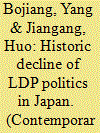

|
|
|
|
|
| Publication |
2009.
|
| Summary/Abstract |
Japan's ruling Liberal Democratic Party (LDP) suffered a crushing defeat in the August 30th general election to the House of Representatives.This was due to a change in election rules, the decline of LDP's traditional bases of support, and the long-standing internal problems.If the LDP now fails to respond to these changed realities, it will further lose credibility with the Japanese people.
|
|
|
|
|
|
|
|
|
|
|
|
|
|
|
|
| 15 |
ID:
072198


|
|
|
| 16 |
ID:
130627


|
|
|
| 17 |
ID:
092264
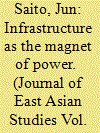

|
|
|
|
|
| Publication |
2009.
|
| Summary/Abstract |
By examining party-switching decisions among members of Japan's Liberal Democratic Party (LDP), this article shows how distributive policy programs exclusively available to the governing party attract incumbents to the party in power. In a stable electoral environment where the government party is likely to stay in power, legislators elected from infrastructure-poor constituencies are effectively tied to the party. However, when the party's electoral prospects are uncertain, legislators behave more sincerely and switch parties to match their policy preferences. It is also found that defectors elected from infrastructure-poor constituencies tended to return to the LDP once the party installed a stable surplus coalition.
|
|
|
|
|
|
|
|
|
|
|
|
|
|
|
|
| 18 |
ID:
130616
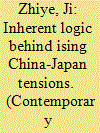

|
|
|
| 19 |
ID:
086684
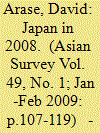

|
|
|
|
|
| Publication |
2009.
|
| Summary/Abstract |
Events in 2008 suggest that the Koizumi era is over and the Liberal Democratic Party will lose the lower house election that must be called before its current term expires in September 2009. The Democratic Party of Japan became the favorite to win the election and laid out the new domestic and foreign policy directions in which it will take Japan.
|
|
|
|
|
|
|
|
|
|
|
|
|
|
|
|
| 20 |
ID:
137905
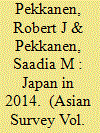

|
|
|
|
|
| Summary/Abstract |
It was all about Abe in 2014. With few intra-party challengers, a divided and weak opposition, and a huge victory in a December snap election gamble, Japan’s Prime Minister Abe finds unusual scope to lead the nation both domestically as well as internationally in his chosen course of ‘‘proactive pacifism.’’
|
|
|
|
|
|
|
|
|
|
|
|
|
|
|
|
|
|
|
|
|